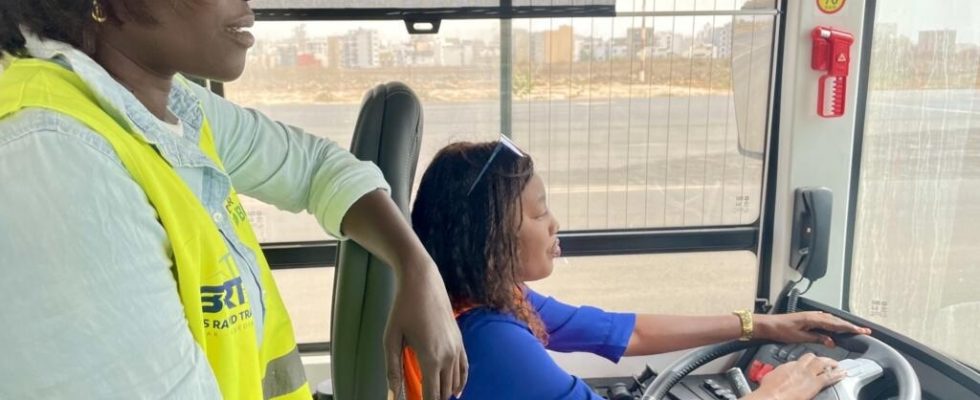In Senegal, certain professions still have an image as men’s jobs, this is the case of bus drivers. However, many women love driving and imagine themselves behind the wheel. Around twenty trainees are currently being trained to become drivers of the BRT, the brand new electric buses which will serve Dakar and its suburbs. They are proud to change mentalities
3 mins
With our correspondent in Dakar, Juliette Dubois
In an electric bus, on the runway of the old Dakar airport, it’s time for driving exercises. Yaye Astou Thiam is at the wheel and Fary, his trainer, gives him advice. The trainees were approached by the BRT operator, Dakar Mobilities, at the driving school where they were taking their car license. Many jumped at the opportunity, like Cléophace Apolline Mané, 34, who worked in restaurants and as a cleaning lady: “ In Senegal, there are too many young people, unemployment is there. So if the opportunity presents itself, you have to seize it. The opportunity presented itself to me. Plus, it was my dream since I was little. So, icing on the cake! »
Since October, the 22 female trainees have passed their D license, then followed theory and practical courses on buses. Anna Ndour put aside her teaching profession for this training: “ Very proud to be a woman and to be able to participate in the change in transport, in this profession that we thought was a man’s profession, when it is only intelligence that must be used to be able to do it. So, I don’t see why, quote, we want to limit this to men. »
If they validate the tests, the trainees will be hired to drive the BRT which should enter service this month of May. Yaye Astou Thiam is impatient to take her first passengers: “ They will all be surprised to see ladies. Above all, perhaps we are considered a little bit like little girls, driving buses of this size of 18.75 meters. And we are very happy to be among the first promotions. » The objective for the end of the year: 352 drivers, including around fifty women.
Read alsoSenegal: a collective denounces the underrepresentation of women in government
Sexism persists in West Africa in all professions. In Ivory Coast, feminist activist De Laure Nesmon Pie, president of the NGO Opinion Éclairée, regrets that men are over-represented in the governing bodies of trade union centers, the only ones authorized to express workers’ grievances before the government. “ It turns out that these union centers are led by men at the forefront. When they speak out and talk about workers’ issues, rarely does the issue of women’s rights come to the surface. However, we will see trade union centers, like Fesaci, which today have women’s sections which are expressing themselves more and more and which are on the ground and which have demands”, she explains. By Laure Nesmon Pie fears that women will not be able to take a leading place as in political parties where women’s sections have been created, but women will not be able to express themselves as general secretary at the top of the party : “ We should now open up so that they occupy the head of the unions, to express the problems, and of men and women in an equitable manner. Like the question of Convention 190 of the International Labor Organization (ILO) which recognizes the right of everyone to a world of work free from violence and harassment, including based on gender. It turns out that, until now, Côte d’Ivoire has not yet ratified this Convention which remains a strong plea for women, but which is not always heard during the May 1 celebrations because the voices women are invisible. »
